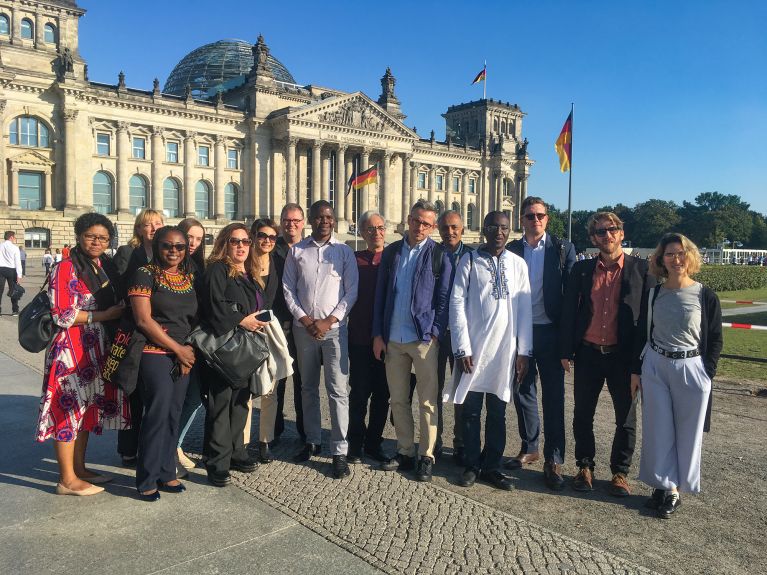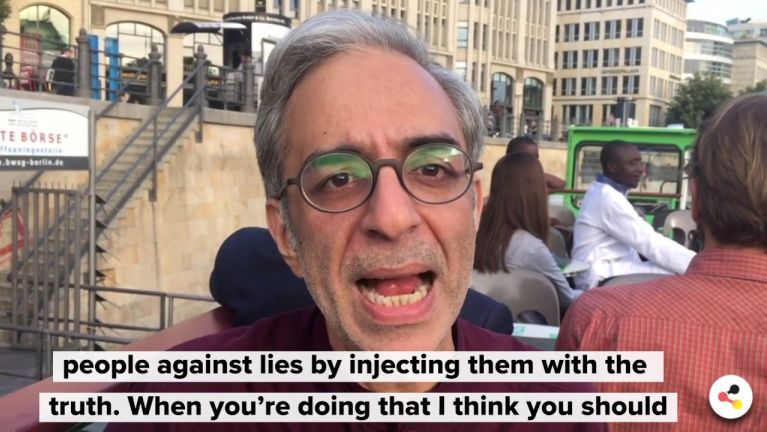Fight against fake news
Information or disinformation? German journalists share their experience with journalists from all over the world.

Political propaganda and disinformation make the work of many journalists all over the world a difficult, sometimes even frustrating, endeavour. In some countries, it is the governments themselves that spread false information in pursuit of their political goals. Or aggressive interest groups try to dominate important social debates, often using the social media amplification effect. The international journalists who were invited by the Foreign Office to the theme week "Fake News - The Role and Responsibility of the Media" as part of the visitors programme of the Federal Republic of Germany reported on all these current challenges.
The visitors were above all interested in how their German colleagues deal with the issue. Does the German state also try to influence the media? What is the best strategy against hate comments on social media? Is it enough to refute false stories, or is far more needed?
Responsibility for education
It soon became clear in the discussion that the most crucial thing is to describe the problem as precisely as possible. And that could be a first important step to saying goodbye to the term “fake news”. “We’re now dealing here with a political battle cry that is increasingly being used to discredit other opinions”, said journalist Kristin Becker (ARD), who reported on the current situation in Germany during a discussion round. "Apart from that, our current main problem in Germany isn’t the spread of hard false reports, but of tendentious semi-truths. I'd prefer the term ‘disinformation’ here. "
Veronique Brüggemann, social media editor at Spiegel Online, agrees: "One of our main problems is the ubiquity of the term and the problem that many people can no longer classify things properly. Is it propaganda, satire, or a misrepresented fact based on a faulty research?" This uncertainty is now leading many people to a diffuse loss of confidence in news reporting. "It’s also our responsibility here to educate. Uncovering and correcting a hoax doesn’t mean that the whole medium is corrupt."
Dieses YouTube-Video kann in einem neuen Tab abgespielt werden
YouTube öffnenThird party content
We use YouTube to embed content that may collect data about your activity. Please review the details and accept the service to see this content.
Open consent formWithdrawal isn’t an option
For journalists from other countries, this may be a luxury issue. Those for whom their own government are an opponent probably have their hands full with the refutation of false reports. Those who are overwhelmed by hate comments on social media platforms may invest too much energy in the discussion with the haters, and so end up missing in the fight against misinformation.
The journalist Karolin Schwarz, founder of the fact-checking platform Hoaxmap, and also a participant in the discussion round, nevertheless thinks it important to interact with users: "There’s this thesis that communities would regulate themselves if only we let them, that in the end it makes sense to moderate as little as possible. I think that's wrong." Veronique Brüggemann agrees: "Withdrawal isn’t an option. Especially because we should strengthen those voices which we can still reach with arguments."
Finding facts
The decisive role played by the German media system in this regard was seen in the example of projects such as Fact Finder, an online service of the ARD, which has been reviewing the truthfulness of doubtful reports since 2017. A private media company couldn’t afford such a platform", says Brüggemann. "This is only possible as part of fee-financed public service broadcasting, such as we have in Germany."
Dieses YouTube-Video kann in einem neuen Tab abgespielt werden
YouTube öffnenThird party content
We use YouTube to embed content that may collect data about your activity. Please review the details and accept the service to see this content.
Open consent formYou would like to receive regular information about Germany?
Subscribe here:



